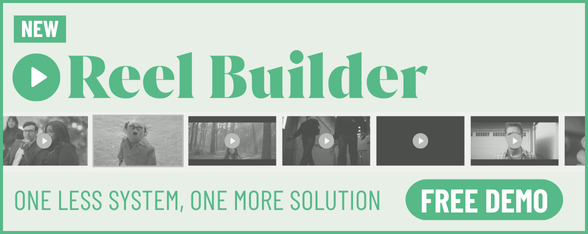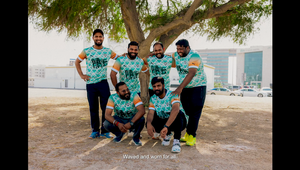
Scott Feasey on How He’s Powering Culture in the Middle East with M+C Saatchi

Based in the Middle East for nearly 25 years, Scott has not only witnessed – but helped shape – the rapid transformation of the region. Now, under the global repositioning of M+C Saatchi’s offering around 'Cultural Power', he’s building a bold new framework for brand growth that feels especially resonant in this rich and complex market.
“We see 'Cultural Power' as the most effective area for brands to flex their marketing muscles,” Scott says. “In this region, it’s not about abandoning traditional marketing – but rather, making sure we’re connecting with audiences through authentic, culture-led narratives.”
At its core, Cultural Power is about helping brands actively participate in and shape culture, not just observe it. According to Scott, brands that engage deeply with cultural conversations grow six times faster than those that don’t, and are 38% more trusted.
The M+C Saatchi model breaks this down into four key pillars:
- Desire – drawing consumers in by tapping into authentic cultural communities;
- Influence – shaping conversations that matter;
- Presence – being in the right places at the right time;
- Momentum in the Moment – sustaining cultural relevance over time.
These principles aren’t theoretical – they’re already in action across the Middle East.
While the global strategy is aligned across M+C Saatchi’s regions, Scott is clear that its application must reflect local nuance.
“In the Middle East, we’re focusing on brands participating authentically in relevant cultural spaces and having more of a voice and opinion in how their country or culture is moving forward,” he says.
This requires more than creative flair. It demands a deep understanding – of anthropology, sociology, generational shifts, and technological adoption. Scott’s team in the UAE reflects this multicultural depth, with 19 nationalities represented across the agency.
“There’s a unifying identity across the Arab world,” he explains, “but of course, there are also subtle – and significant – differences between Saudi, Emirati, Qatari culture, and even within demographics like gen z or gen alpha. Our job is to unpack those nuances and translate them into powerful cultural insights.”
Two standout examples showcase how this thinking translates into real-world impact.
For Mobily, one of Saudi Arabia’s largest telcos, M+C Saatchi reimagined its traditional messaging strategy by leaning into youth culture. During a period of Covid-driven isolation, they launched ‘Green is Go’, a campaign celebrating the unstoppable ambition of young Saudis. Using a colour-recognition Snapchat lens – an innovation first for the region – they unlocked music and content by snapping anything green, a nod to the national flag and spirit. Collaborating with rapper Slow Moe, the campaign created a cultural movement that resonated far beyond standard comms.
Then came ‘Everybody’s Kingdom,’ a campaign challenging stigma around disability. A teaser film that edited out sections of the Saudi national anthem sparked national curiosity – only to later reveal that those sections would be performed by people of determination. The campaign engaged consumers and prompted real policy change, seeing store ramp installations built and inclusive playgrounds backed by royal endorsement.
The shift toward Cultural Power isn’t just a creative or social initiative – it’s a business strategy, supported by data.
“We’re not walking away from traditional KPIs,” says Scott, “but Cultural Power is proving to be one of the strongest indicators of long-term brand success.”
M+C Saatchi’s Cultural Power Index is a proprietary AI tool that helps brands assess their cultural resonance across the four pillars. It uses millions of data points to measure what matters most to consumers – and to map where brands stand against competitors.
“We want brands to stop pushing messages and start pulling consumers in,” he explains. “When you lead culture, instead of letting it define you, that’s when you grow.”
One of the most powerful elements of the Cultural Power proposition is how it connects M+C Saatchi’s global network.
“In my eight years as CEO here, this is the most aligned we’ve ever been,” says Scott. “The five regional CEOs – myself, Australia, New York, UK, and Europe – are completely united on this vision.”
That alignment allows regional offices to tap into shared tools, frameworks, and case studies – while still tailoring execution to local nuance. The stories they tell just look, sound, and feel different.
In tandem with the new proposition, M+C Saatchi has undergone a significant rebrand. The iconic ampersand has been replaced with a plus sign, reflecting the expanded and interconnected nature of the agency’s services, which now span consultancy, PR, sport and entertainment, media, and more.
“We’ve often advised our clients to refresh every 10–15 years to stay culturally relevant,” Scott says. “Now, after almost 30 years, we’re doing the same.”
In the Middle East, that ‘plus’ is being put to work immediately, with big plans ahead – particularly in the Sport & Entertainment space. While details remain under wraps, Scott hints at major announcements in the coming months that will double down on the agency’s regional presence and impact.
The ultimate goal of the agency remains its longstanding mission, to create ‘Meaningful Change’. But Cultural Power is now a vehicle to get there more effectively.
“Change doesn’t have to be slow. If you start the right cultural conversation, creatively and authentically, it can happen fast. But consistency is key,” he says. “You need to show up regularly, with relevance, and with intent.”















